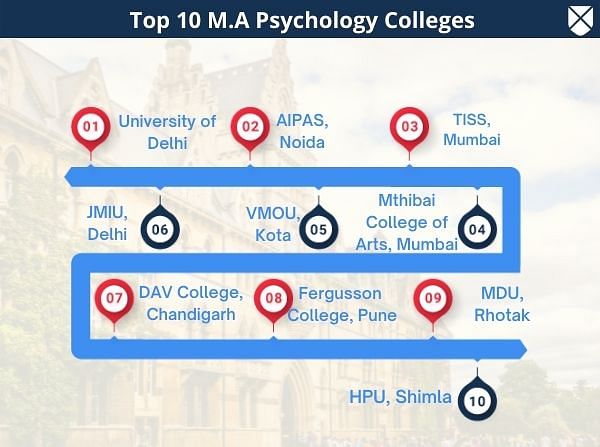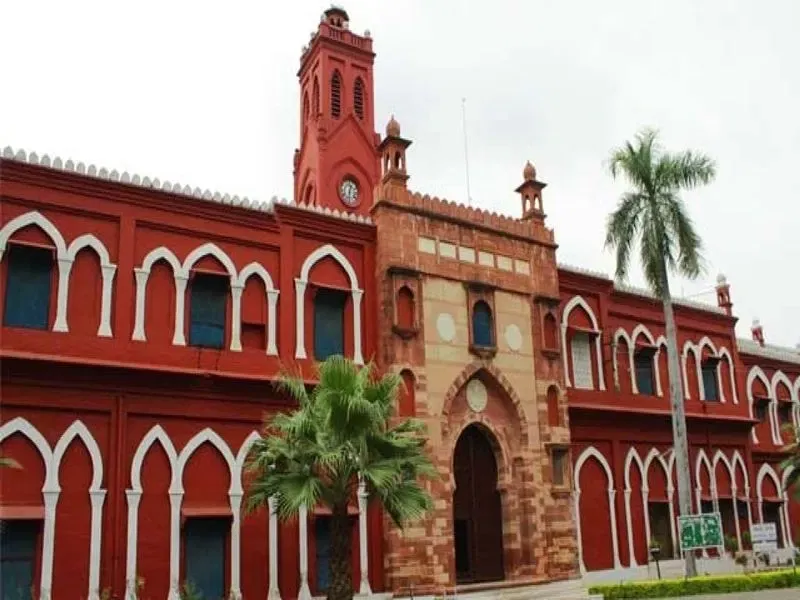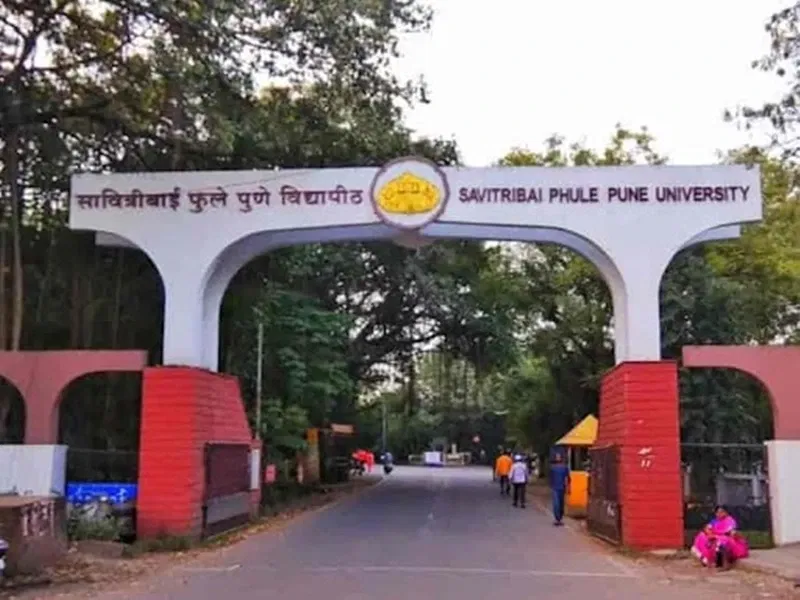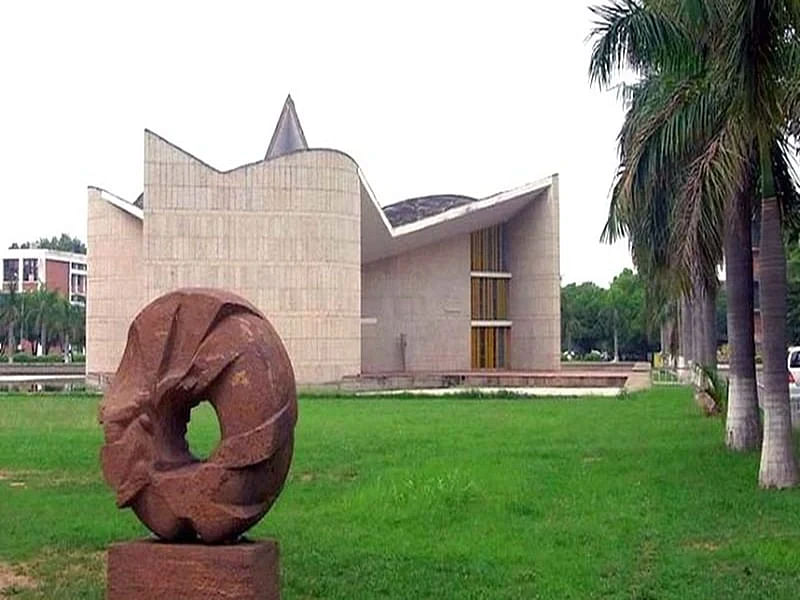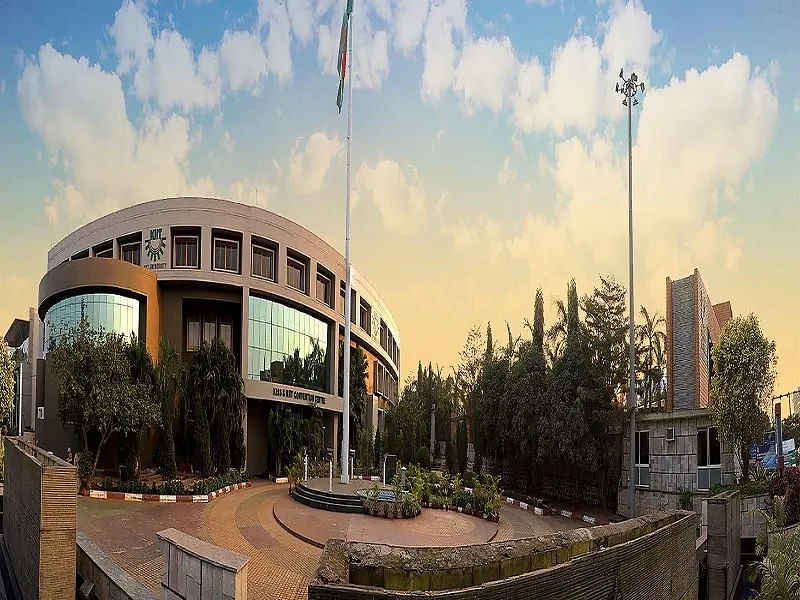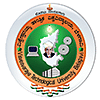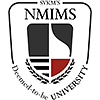MA Psychology: Course Details, Eligibility, Admission, Fees

MA Psychology is a two-year-long postgraduate course that deals with the science of behaviour and mind, including conscious and unconscious phenomena, as well as feeling and thought. After the completion of the Psychology in MA course, there are many job opportunities available to the graduates. Some of the roles that the students start with are School Counselor, Sr. Editor, Assistant Professor - Postsecondary/Higher Education, Executive Administrator, Process Analyst, etc.
Table of Contents
- About MA Psychology
- Eligibility Criteria for MA Psychology Course
- How To Get Admission to a MA Psychology?
- Who Should Pursue a MA Psychology?
- Types of MA Psychology
- MA Psychology Specializations/Courses
- Popular Entrance Exams for MA Psychology
- Study MA Psychology in India
- Top 10 MA Psychology Colleges in India
- Fee Structure for MA Psychology
- Integrated/Bridge Courses
- Syllabus and Subjects for MA Psychology
- Why Choose MA Psychology?
- MA Psychology Course Comparison
- Preparation Tips for MA Psychology
- Scope For Higher Education
- Salary of a MA Psychology Graduate
- Career Options After MA Psychology
- Skills That Make You The Best MA Psychology Graduate
MA Psychology Course Details
| Degree | Masters |
| Full Form | Master of Arts in Psychology |
| Duration | 2 Years |
| Average Fees | ₹10K - 80K PA |
| Average Salary | INR 3.5 LPA [Source: PayScale] |
| Employment Roles | School Counselor, Mental Health Counselor, Principal/Headmaster, Editor, Assistant Professor - Postsecondary / Higher Education, Executive Administrator, Process Analyst etc |
| Top Recruiters | Colleges, Schools, Counselling Centres, Healthcare Centres etc |
About MA Psychology
MA Psychology full form is Master in Psychology that examines the behaviour and psychology of people. MA Psychology syllabus and subjects are diversified in a well-structured format to provide students with a comprehensive understanding of the course. The MA Psychology courses teach individuals to think critically, and objectively which plays an important role mainly in research and is integrated throughout their studies. MA Psychology job scope is vast in terms of exposure, job roles, and lucrative salary.
Eligibility Criteria for MA Psychology Course
For MA Psychology admission aspirants must ensure that they fulfil all the MA Psychology eligibility. The basic eligibility criteria for the MA Psychology course include candidates who must have completed their Bachelor of Arts [BA] (Psychology) with 55% marks or above from a recognized college/university in India. Some reputed MA Psychology colleges admit students on the basis of entrance exam scores conducted by them. As part of the MA Psychology eligibility, there is no maximum age limit for applying for the course.
How To Get Admission to a MA Psychology?
Aspirants must ensure that they are aware of the MA Psychology eligibility in India to get admission to the college of their choice. The admission procedure is carried out in online or offline mode. The admission process, despite the specialization, does not change for a Master of Arts.
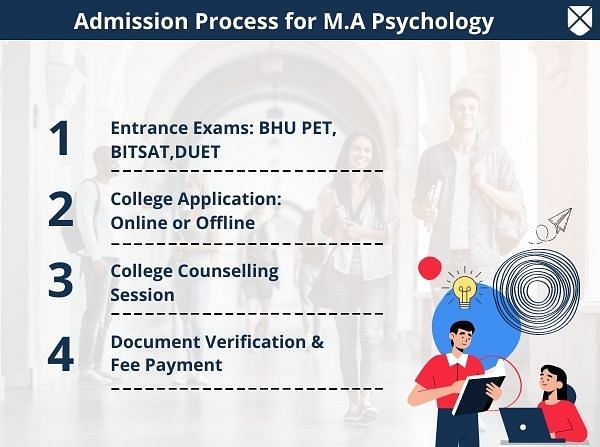
Mentioned below are the details of the admission process in general:
How to Apply?
To apply for an MA Psychology in India, students can apply for admission through online and offline methods. The online application for the MA Psychology course is done by going to the official website of the colleges students are interested in. On the college website, students must fill out the online form and submit it with all the required documents and proofs. For offline admissions, the aspirants are required to go to the admission office near them and fill-up the form.
Selection Process
The selection process for the MA Psychology course in India is based on the final outcome and marks that the students obtain in their undergraduate degree as well as their entrance exams. A rank list will be published based on it, upon which the students will be called for a counselling session. Based on the overall marks obtained by the students, the eligible candidates are offered admission to the program.
Who Should Pursue a MA Psychology?
A master's degree in psychology equips students with the foundations and theories of human behaviour, as well as the skills to utilize these tools to analyze and develop treatment strategies for a variety of mental health conditions. A master's degree in psychology is an excellent place to start for people interested in studying human behaviour and assisting others in overcoming challenges. It opens up a wide range of career options and can serve as a stepping stone toward a doctorate later on.
When To Do MA Psychology?
If a student wants to pursue a career as a Psychology expert or therapist, they should begin at the postgraduate level. They must pass a graduation degree from a recognized university.
Types of MA Psychology
Aspirants can pursue the course in full-time or part-time mode. Below are the types of MA Psychology courses in detail:
Full-Time
The full-time MA Psychology course lasts two years. This course requires more practical knowledge than theoretical understanding. The advantage of a full-time course is that students can gain a lot more exposure, experience and knowledge through direct interaction with their peers and faculty.
Part-Time
The part-time MA Psychology course is designed for students who cannot attend regular classes. The duration of the course is 2 years. The advantage of the part-time course is that students can pursue this course while simultaneously being engaged in employment or internship.
Distance
The distance MA Psychology programme lasts two years and is divided into four semesters of six months each. For those who wish to pursue a higher degree in Psychology after graduation but don't have the time to attend normal classes, distance learning is the ideal option. This is also an ideal situation, for those who have constraints due to location.
MA Psychology Specializations/Courses
When it comes to MA Psychology, there are a variety of specializations to choose from. The following are some of the specialized courses that are available:
- Clinical Psychology
- Cognitive Psychology
- Development Psychology
- Counselling Psychology
- Educational Psychology
- Forensic Psychology
- Social Psychology
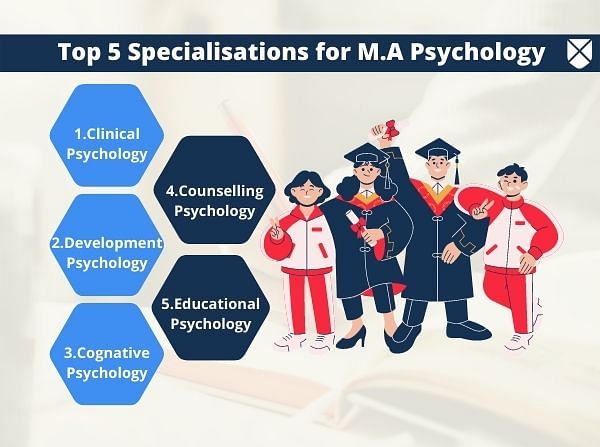
Popular Entrance Exams for MA Psychology
There are many entrance exams that are conducted around the country by the colleges to give admission to the MA Psychology course. Entrance exams play a vital role in the admission process and selection. The MA Psychology colleges in India use entrance exams as a means to shortlist candidates when giving admission to the course. Listed below are some of the popular entrance exams for the MA Psychology course:
A Quick Glance at the MA Psychology Entrance Exams
The best MA Psychology colleges in India conduct entrance exams as a means of deciding which student to give admission to. Listed below are the general guidelines and pattern of MA Psychology course entrance exams:
- The paper has questions in 100 MCQ format
- There will be two parts to the question paper.
- The exam duration is 3 hours.
- The question paper is set in English.
- 1 to 4 marks will be rewarded for correct answers.
- No negative marking for an incorrect answer.
Study MA Psychology in India
India is home to some of the best MA Psychology colleges for aspirants. Candidates have many options to choose from in terms of the best MA Psychology course as per their preferences. Depending on the type of MA Psychology programs offered, candidates will have to make the appropriate choice. Below are some of the top colleges in India offering MA Psychology courses:
Top 10 MA Psychology Colleges in India
MA Psychology's best colleges in India provide students with all the essential and important infrastructure they would need to have a successful career in the field of psychology. There are many good colleges around the country which provide the Masters in Arts in Psychology course to the aspirants. Listed below are the top 10 MA Psychology colleges in India:
| Sl. No. | Name of the Institute |
| 1 | University of Delhi |
| 2 | Amity Institute of Psychology and Allied Sciences, Noida |
| 3 | Tata Institute of Social Sciences |
| 4 | Jamia Millia Islamia University |
| 5 | Vardhaman Mahaveer Open University |
| 6 | Mithibai College of Arts |
| 7 | DAV College |
| 8 | Fergusson College |
| 9 | Maharshi Dayanand University |
| 10 | Himachal Pradesh University |
Top MA Psychology Colleges in New Delhi
India’s capital city is home to some of the best institutions for MA Psychology in India. Check the table below for the top MA Psychology colleges in New Delhi:
| Sl.No | Institution |
| 1 | Lady Shri Ram College for Women |
| 2 | Indraprastha College for Women |
| 3 | Jamia Millia Islamia University |
| 4 | Delhi University |
| 5 | Daulat Ram College |
Read More: MA Psychology Colleges in Delhi
Top MA Psychology Colleges in Mumbai
Mumbai also has some of the best institutions for MA Psychology in India. Check the table below for the top MA Psychology colleges in Mumbai:
| Sl.No | Institution |
| 1 | St. Xavier’s College |
| 2 | K.J. Somaiya College of Arts and Commerce |
| 3 | Kishinchand Chellaram College |
| 4 | Mithibai College of Arts |
| 5 | Tata Institute of Social Sciences |
Read More: MA Psychology Colleges in Mumbai
Top MA Psychology Colleges in Pune
Pune is home to some of the premier institutions for MA Psychology in India. Check the table below for the best MA Psychology colleges in Pune:
| Sl.No | Institution |
| 1 | Fergusson College |
| 2 | Symbiosis College of Arts and Commerce |
| 3 | Dr. D.Y. Patil Institute of Technology |
| 4 | Savitribai Phule Pune University |
| 5 | Vishwakarma University |
Read More: MA Psychology Colleges in Pune
Top MA Psychology Colleges in Lucknow
The capital city of Uttar Pradesh is renowned around the country for colleges offering top MA Psychology programmes. Check the table below for the best MA Psychology colleges in Lucknow:
| Sl.No | Institution |
| 1 | National Post Graduate College |
| 2 | University of Lucknow |
| 3 | Integral University |
| 4 | Shri Ramswaroop Memorial University |
| 5 | Maharishi University |
Read More: MA Psychology Colleges in Lucknow
Top MA Psychology Colleges in Chandigarh
Chandigarh has some of the best colleges for MA Psychology courses in India. Check the table below for the best MA Psychology colleges in Chandigarh:
| Sl.No | Institution |
| 1 | MCM DAV |
| 2 | DAV College |
| 3 | Post Graduate Government College for Girls |
| 4 | Panjab University |
| 5 | Chandigarh University |
Read More: MA Psychology Colleges in Chandigarh
Top MA Psychology Colleges in Jaipur
The Pink City of India has some premier institutions in the country for MA Psychology. Check the table below for top colleges for MA Psychology in Jaipur:
| Sl.No | Institution |
| 1 | Banasthali Vidyapith |
| 2 | JECRC University |
| 3 | Amity University |
| 4 | Apex University |
| 5 | NIMS University |
Read More: MA Psychology Colleges in Jaipur
Top MA Psychology Government Colleges
There are several top Government Colleges offering quality MA Psychology programmes across the country. Check the table below for the top MA Psychology government colleges in India:
| Sl.No | Institution |
| 1 | Delhi University |
| 2 | JMI, New Delhi |
| 3 | Banaras Hindu University, Varanasi |
| 4 | Bangalore University |
| 5 | Ambedkar University, Delhi |
Top MA Psychology Private Colleges
India has seen significant growth in the number of quality MA Psychology private colleges that offer some of the best programmes in the country. Check the table below for the top MA Psychology private colleges in India:
| Sl.No | Institution |
| 1 | St. Xavier’s College, Mumbai |
| 2 | Mithibai College of Arts, Mumbai |
| 3 | Fergusson College, Pune |
| 4 | St. Xavier’s College, Ahmedabad |
| 5 | Kishinchand Chellaram College, Mumbai |
Fee Structure for MA Psychology
The MA Psychology course fee is not fixed for all colleges in India and can vary due to many factors. The MA Psychology fee can depend on factors like the facilities available in the colleges, the faculty, location, and more. The average course fee for the MA Psychology course ranges from INR 10,000 to 80,000 PA.
| Sl. No. | Name of the Institute | Average Annual Fees |
| 1 | Gargi College, Delhi | INR 27,000 PA |
| 2 | Miranda House, Delhi University | INR 60,000 PA |
| 3 | Amity University, Noida | INR 3.8 LPA |
Integrated/Bridge Courses
Psychology with Advanced Research Methods: This Integrated Master in Science degree combines in-depth coverage of all aspects of psychology with an extraordinary understanding and practical skills in advanced research methodologies to deliver one of the most immersive and interesting experiences of studying the human mind. This will include integrating modules from existing courses and developing skills acquired in research methodologies to an advanced level.
The course duration is 4 years. Students will graduate with a Masters-level qualification, a strong theoretical foundation, and specialist expertise after completing the course through advanced independent research.
Eligibility criteria
Class 10th
- Mathematics- Minimum 60%
Class 12th (excluding PE and local language subjects)
- Mathematic- Minimum 40%
- English (CBSE or CISCE board)- 70%
- Average best four subjects-
- CBSE, CISCE and other regional and national boards - 75%
- Karnataka (Bangalore), Madhya Pradesh and Uttar Pradesh boards - 65%
- Kolkata (West Bengal board) - 60%
- Fees: INR 19.5 LPA
Syllabus and Subjects for MA Psychology
The syllabus and subjects of the MA Psychology course are designed to introduce students to all the vital aspects of the field of human psychology, human behaviour, and therapy. The MA Psychology course is a two-year-long postgraduate course, which gives the students a chance to learn and study psychology in a more detailed and in-depth manner.
Listed below are some of the core subjects in the course:
- Systems and Theories
- Cognitive Psychology
- Social Psychology
- Research Methods and Statistics
Read More: MA Psychology Syllabus and Subjects
Why Choose MA Psychology?
Students often wonder about MA Psychology course details before choosing the course. Before deciding on a career, students come across queries like, "What is a MA Psychology course?" and "Why choose a MA Psychology Degree?”. To clearly understand the answers to these questions and know more about the MA Psychology course, we have framed the following three pointers:
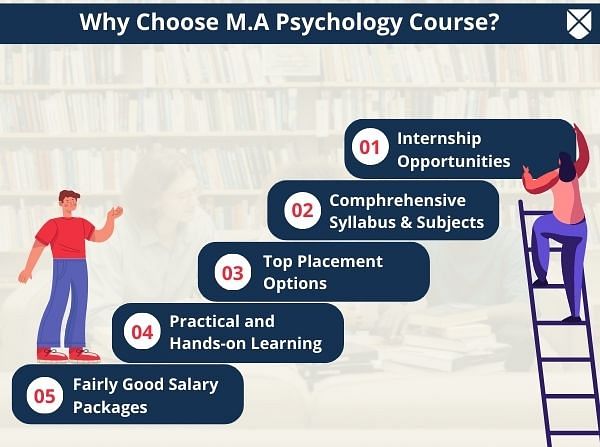
What is MA Psychology All About?
MA Psychology provides an insight into the deeper aspects of psychology as a field and also helps the students to understand the professional aspects of it. An MA degree may indicate a stronger liberal arts focus and candidates with an MA degree are given preference when it comes to employment. There are colleges/universities which provide specialization in clinical psychology which is the most preferred subject for an aspiring psychologist.
What Does a MA Psychology Graduate Do?
The MA Psychology course is suitable to have a unique learning experience by integrating counselling skills and scientific psychology, encouraging personal and spiritual growth and preparing students for doctoral studies. The graduates are able to use logic and reasoning to identify the strengths and weaknesses of alternative solutions, conclusions, or approaches to problems.
Therapist: A therapist is a licensed medical professional that evaluates, diagnoses, and treats people with emotional and mental disorders.
Reasons Why MA Psychology Can Fetch You a Rewarding Career?
Many psychologists practice right out of their homes, and this is something that appeals to anyone who doesn't want to make the morning commute to the office. Psychologists are often referred to as therapists and work with individual patients, or alternatively, with couples, and they tend to have a designated area within their home where they see their patients.
Diversity And Relevancy Of The Education: With a Master's Degree, students can understand the implications of new information for both current and future problem-solving and decision-making. Applicants also possess the ability to select and use training/instructional methods and procedures appropriate for the situation when learning or teaching new things.
Read More: MA Psychology Jobs and Scope
MA Psychology Course Comparison
A master's degree in Psychology can be earned as an MSc or an MA. The focus of the two streams differs slightly, but the eligibility requirements are nearly identical. Below is a comparison of the MA Psychology course with the M.Sc Psychology course:
MA Psychology vs M.Sc Psychology
The table below showcases the differences between MA Psychology and M.Sc Psychology:
| Course | MA Psychology | M.Sc Psychology |
| Full-Form | Master of Arts in Psychology | Master of Science in Psychology |
| Stream | Humanities | Science |
| Course Duration | 2 years | 2 years |
| Eligibility | Graduation degree with a minimum 50% aggregate from a recognized university. | B.A. or MAin Psychology with a minimum 50% aggregate from a recognized university. |
| Entrance Exams | TISSNET, DUET, etc. | BHU PET, IPU CET, etc. |
| Top Colleges | Fergusson College, DAV College, etc. | Banaras Hindu University, Allahabad University, etc. |
| Fees | INR 10,000 - 95,000 PA | INR 20,000 - 3 LPA |
Read More: M.Sc Psychology
Preparation Tips for MA Psychology
When pursuing the MA Psychology course, it is important for the students to ensure that they take steps to prepare themselves for the exams and the course. Listed below are some of the essential tips that the students should take:
Research About The Curriculum: It is important for the students to research the curriculum of the course beforehand as it can help them learn about the topics and subjects beforehand and it will ensure that they don’t struggle when studying the course.
Get In Touch With The Alumni: It is a good idea for the students to get in touch with the alumni and understand their expectations and experience from the course as it can help the students to prepare themselves for any hurdles they might face in the future.
Knowledge of the Exam Paper: Preparing for the exams with the reference to previous question papers could make it easy for a candidate to prepare during exams.
Scope For Higher Education
MA Psychology is a master’s program making it a popular higher education option for students with a BA degree. Many graduates after the completion of the MA course choose to go for a higher degree to enter the field of research. By obtaining a higher education, students can learn about the subject in greater depth and detail and thus helping them build a more rewarding career for themselves. Listed below are some of the popular higher education options available for students:
Salary of a MA Psychology Graduate
The salary after MA Psychology in India is not fixed and can vary according to many factors. Some of the factors which influence the salary are the experience, location, and level of education that the graduates obtain. The average MA Psychology salary in India is INR 3.5 LPA [Source: PayScale].
Read More: MA Psychology Salary
Career Options After MA Psychology
An MA Psychology graduate has various jobs that are available in various fields of the Industry, the job offered may also vary based on the industry one works in, some of the jobs that are available are listed below:
- Psychologist
- Academic Counsellor
- Human Resource Manager
- Counsellor
- Forensic Psychologist
- Criminal Psychologist
- Care Specialist
- Research Analyst

Skills That Make You The Best MA Psychology Graduate
There are many skills that BHM graduates need to have to ensure that they succeed in their careers. Some of these skills are listed below:
- Flexible Temperament
- Ability to Work Under Pressure
- Time Management Skills
- Quantitative Ability Skills
- Logical Reasoning Skills
